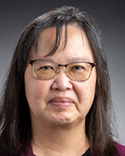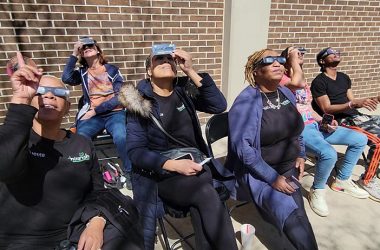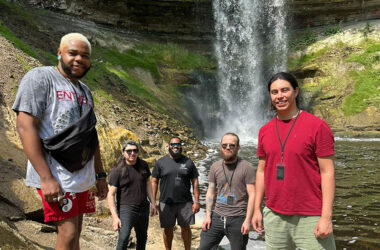Curiosity is something Michelle Chen has always thrived on.
As an engineer at the Applied Physics Lab (APL) at Johns Hopkins University, Chen has worked on a host of interesting research projects. Most recently, she was on the team that developed the autonomous navigation techniques for NASA’s DART Mission that led to the movement of an asteroid on Sept. 26.

The mission is one of NASA’s Planetary Defense Coordination Office initiatives to protect earth should an asteroid be on course to strike. What the mission proved is that there is a way to move an asteroid off course to prevent a disaster.
Her work on the project started about 10 years ago. She was a member of a three-person team brainstorming “how we could guide a spacecraft to an asteroid,” she said. Their work was part-time over three years.
“We developed the image processing and the guidance filter and guidance logic and the maneuver logic ended up feeding the autonomous navigation from DART.”
Three years in, their initial work showed promise and expanded over the next six-plus years to get DART ready for its successful mission.
Chen’s amazing career got started back while living in Hazel Crest and attending Homewood-Flossmoor High School. She credits her calculus teacher, Jack Wayne, with nurturing her inquisitiveness.
She recalls sitting in his class, taking notes, but then he’d turn around and asked, “Why are you guys just taking everything I’m saying as true? Don’t you want to know where this comes from?”
Chen remembers that moment because it was at that point that she realized it was important to ask questions. “The second he said that it really unlocked that key and from that point on I asked why all the time.”
She graduated H-F in 1987 and enrolled at the University Illinois, setting her course for medical school, but she realized it wasn’t for her. She did want to help others through her work, but she really enjoyed math and engineering. She double majored in biomedical engineering and electrical engineering. She went to work at APL and earned a master’s degree in electrical engineering from Johns Hopkins.
Chen does most of her work on algorithms. The math computation acts as an exact list of instructions that conduct specified actions step-by-step in hardware- or software-based routines.
“I like to develop algorithms that you could implement in software to solve hard problems, and that’s kind of why it seems I have done really different things. At the beginning of my career, I was doing image processing of X-rays imaging to automatically detect prostate tumor cells,” she said.
After 9-11 there was a major scare with people receiving anthrax, a highly potent bacterium, via the mail. Chen was with a group of scientists prototyping and developing a way to identify things sent through the mail or aerosolized.
Chen used her skills with X-rays to measure bone density for astronauts returning from space.
And, she was in charge of the software controls that helped develop an electro-mechanical prosthetic limb. Chen worked with a team led by a neurosurgeon who wanted to develop artificial limbs for injured soldiers. He wanted them to be able to control the limb naturally. Chen said the doctor had a woman volunteer to have an electrical board implanted in her brain as part of the research.
“I led the software and control team for the limb. We basically took commands from the person and made it happen on the prosthetic arms. It was really neat.”
“I’ve done some really cool things,” she said. “I’m actually working on another IRAD (Independent Research and Development). I’m working on a couple of IRADS, just because it paves the way for new things.”
Chen’s been involved in the proposal process and optical images to do navigation for Dragonfly, NASA’s next big mission.
“I also feel part of my job is to help teams get off the ground and that particular team is off and running,” she said.
She expects she’ll be part of a team working to get NASA back to the moon.
Chen’s words of encouragement for students is, of course, to be curious. “If there’s something someone finds fascinating, don’t push that to the side. Always ask questions.”




